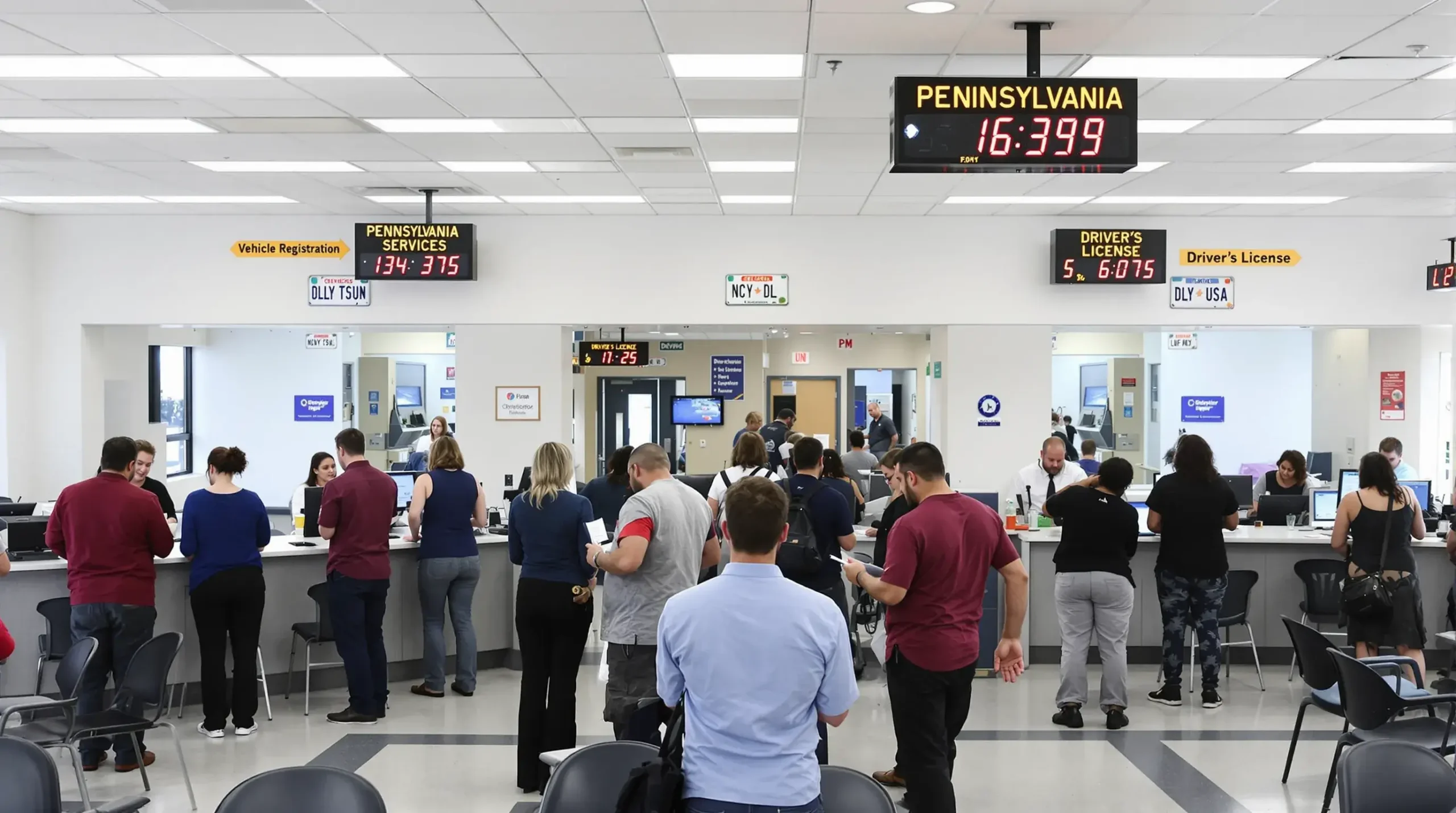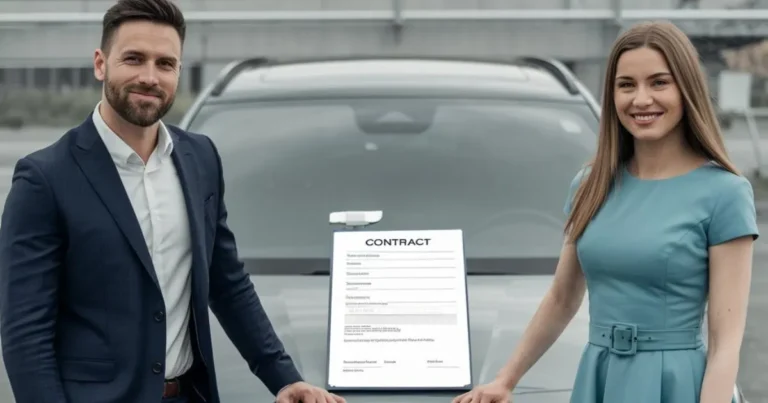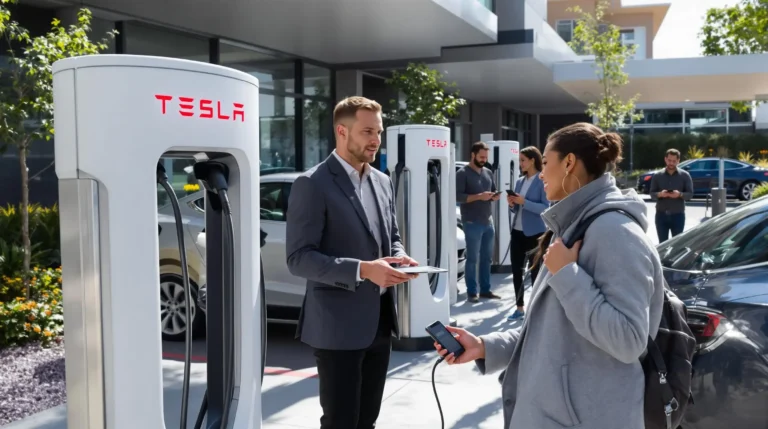Register Car in PA: 5 Simple Steps for New Residents
Hitting the Road Legally in the Keystone State
So, you’ve got a new set of wheels or you’re new to Pennsylvania and ready to explore the scenic routes and bustling cities? That’s fantastic! But before you hit the road, there’s a crucial first step: you need to register car in PA. It might sound like a daunting task, but it’s a necessary part of car ownership. Think of it as your official welcome to Pennsylvania roads. This guide will walk you through everything you need to know to make the Pennsylvania vehicle registration process smooth and straightforward, ensuring you’re legally cruising in no time.
Understanding Pennsylvania Vehicle Registration: Who, What, and Why?
Registering your car isn’t just about following rules; it’s about ensuring safety and accountability on the roads. In Pennsylvania, vehicle registration is mandatory for anyone who owns and operates a vehicle within the state. This applies to new residents moving to PA, individuals purchasing a new or used vehicle, and even those inheriting a car. Think of your Pennsylvania car registration as your car’s official ID. It links your vehicle to you, confirms it meets legal standards, and allows you to legally drive on Pennsylvania roads. Without proper pennsylvania registration, you could face fines, penalties, and even have your driving privileges suspended. So, understanding the pennsylvania registration process is not just a formality, it’s a key aspect of responsible car ownership.
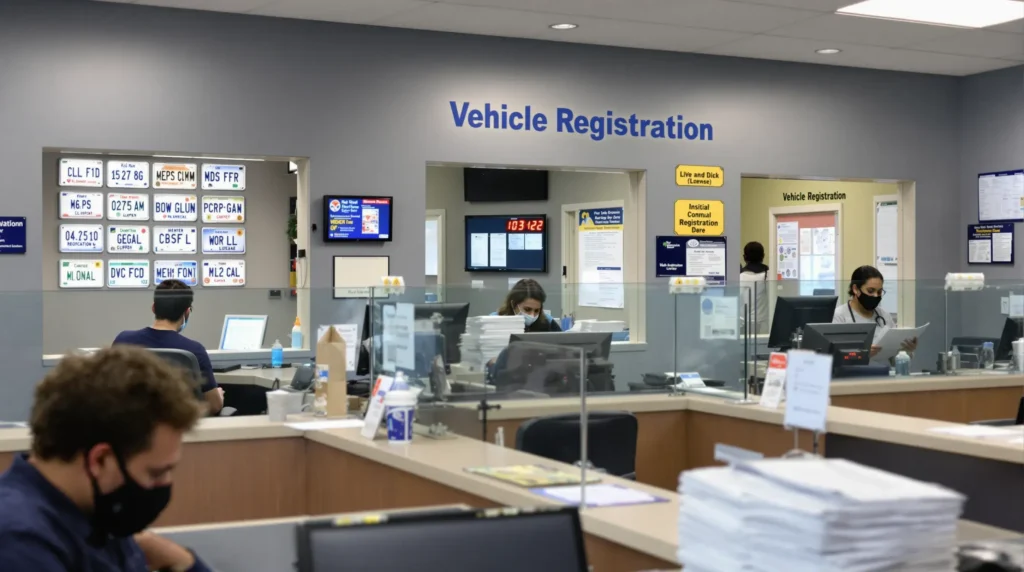
Step-by-Step Guide to Registering Your Car in Pennsylvania
Ready to dive into the specifics of how to register car in pennsylvania? The process might seem like a maze of paperwork, but breaking it down into steps makes it much more manageable. Here’s a comprehensive guide to help you navigate the registration process smoothly:
- Gather Your Documents: Before you head to a PennDOT center or authorized agent, make sure you have all the necessary paperwork in order. This is arguably the most crucial step. You’ll generally need:
- Proof of Ownership: This is usually your vehicle’s Certificate of Title. If you bought a new car from a dealership, they will often handle the initial title and registration paperwork for you. For used cars purchased privately, you’ll need the properly assigned title from the previous owner. Make sure the title number is clearly visible and accurate.
- Proof of Identification: Your valid Pennsylvania driver license or a Pennsylvania photo identification card is essential. For out-of-state residents, a valid driver’s license from your previous state might be accepted initially, but you’ll eventually need to obtain a PA license.
- Proof of Insurance: Pennsylvania law requires you to have valid auto insurance. You’ll need to provide proof of insurance from a company authorized to do business in Pennsylvania. This typically includes your insurance card or a declaration page showing your name, vehicle information, and policy dates. Having proof of insurance is non-negotiable.
- Vehicle Identification Number (VIN) Verification: For out-of-state vehicles being registered in PA for the first time, you might need a VIN verification. This is often done by an authorized inspection mechanic or a notary public. The vehicle identification number is a unique code for your car, and verifying it ensures accuracy in the registration process.
- Application for Certificate of Title and Registration (Form MV-1): You’ll need to complete this form, which you can download from the PennDOT website or obtain at a PennDOT center. Make sure to fill out the completed form accurately and legibly.
- Payment: Be prepared to pay the required oregistration fees and titling fees. Acceptable forms of payment can vary, but generally include cash, check or money order, and sometimes credit or debit cards.
- Vehicle Safety Inspection: Pennsylvania requires vehicles to undergo an annual safety inspection. If your vehicle is new to you or from out of state, it will likely need to pass inspection before you can complete the registration. Find an authorized inspection station and get your vehicle inspected. You’ll receive an inspection sticker upon passing, which is required for registration.
- Emissions Inspection (if applicable): Depending on where you live in Pennsylvania, your vehicle might also require an emissions inspection in addition to the safety inspection. This is typically required in more populated areas to ensure vehicles meet environmental standards. Check if your county requires emissions testing and get your vehicle inspected if necessary.
- Submit Your Application and Fees: Once you have all your documents, your vehicle has passed inspection (if required), and you’ve completed Form MV-1, you can submit your application. You have a few options for submission:
- In Person at a PennDOT Driver License Center: You can visit a PennDOT Driver License Center and submit your application in person. This is often the most straightforward option, especially if you have questions or need assistance.
- Through a PennDOT Authorized Online Messenger: PennDOT has authorized online messengers who can process vehicle registrations. This can be a convenient option for pennsylvania online registration renewal and potentially for new registrations as well, though services and fees may vary. You can often renew registration online pa through these services.
- By Mail (for Renewals and Certain Transactions): While not typically for initial registrations, you can often renew car registration pennsylvania by mail. Check the PennDOT website for specific instructions and eligibility.
- Receive Your Registration Card and License Plate: After your application is processed and approved, you’ll receive your pennsylvania car registration card and license plate. The registration card must be kept in your vehicle at all times. Affix your new pennsylvania registration plate to your vehicle according to PennDOT regulations. Make sure your license plate number is clearly visible.
Pennsylvania registration renewal is a recurring process, typically done annually. Keeping your pennsylvania vehicle registration renewal up-to-date is crucial to avoid penalties and ensure you’re driving legally. Here’s what you need to know about renewing registration pa:
- Renewal Notices: PennDOT usually sends out pennsylvania registration renewal notices by mail a few months before your expiration date. This notice will contain instructions on how to renew and the amount due. However, it’s your responsibility to renew even if you don’t receive a notice.
- Renewal Options: Just like initial registration, you have several options for pennsylvania registration renewal online and offline:
- Online Renewal: The easiest and fastest way to renew car registration pa online is through the PennDOT website or an authorized online messenger. You’ll need your vehicle information, insurance details, and a valid payment method. This is often referred to as penndot registration renewal online.
- By Mail: You can also renew registration online pa by mail using the renewal application form included with your renewal notice. Mail the completed form and payment to the address provided.
- In Person: You can visit a PennDOT Driver License Center or an authorized agent to renew in person. This is helpful if you prefer face-to-face assistance or need to handle other transactions at the same time.
- Timing is Key: Don’t wait until the last minute to renew your vehicle registration. Allow ample time for processing, especially if renewing by mail. Driving with an expired pa car reg can lead to fines. You can often renew your vehicle registration up to 90 days before the expiration date.
- Checking Your Registration Status: If you’re unsure about your pennsylvania registration renewal status or expiration date, you can often check vehicle registration status pa online through the PennDOT website. This is a useful tool to ensure you’re always compliant. You can also learn how to check my car registration pa through PennDOT’s online resources.
- Philadelphia Registration Renewal: For residents of Philadelphia, the philadelphia registration renewal process is generally the same as for the rest of Pennsylvania, but it’s always wise to check for any city-specific guidelines or resources.
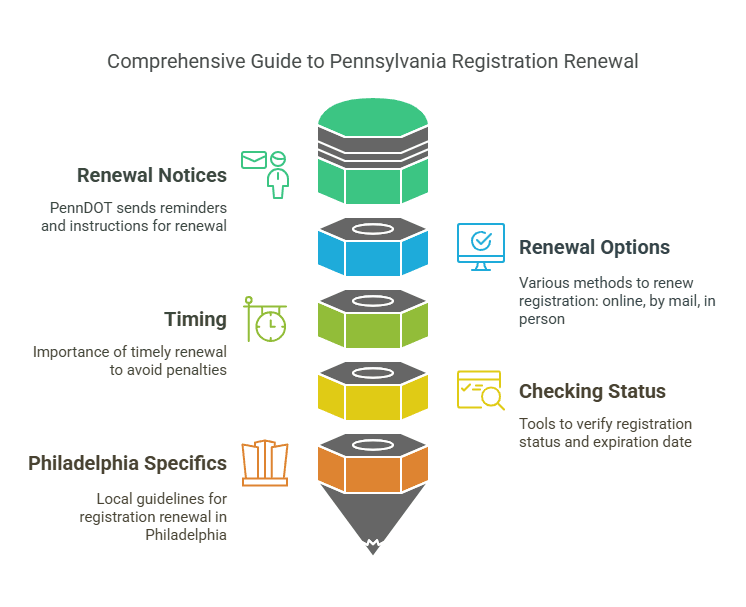
Understanding Pennsylvania Registration Fees and Costs
Budgeting for car ownership includes understanding the costs associated with oregistration fees and titling fees. These fees can vary depending on vehicle type, weight, and other factors. Here’s a general overview:
- Registration Fees: The basic registration fees in Pennsylvania are typically annual and cover the cost of maintaining the vehicle registration system and road infrastructure. The exact fee amount is determined by PennDOT and can be found on their official website.
- Titling Fees: Titling fees are incurred when you transfer ownership of a vehicle, such as when you buy a new or used car. These are one-time fees associated with issuing a new Certificate of Title.
- Other Potential Fees: Depending on your situation, you might encounter other fees, such as:
- Vehicle Sales Tax: Pennsylvania charges sales tax on vehicle purchases.
- Local Taxes: Some localities may impose additional vehicle-related taxes.
- Late Fees: If you fail to renew your vehicle registration on time, you may be charged late fees.
- Duplicate Fees: If you lose your registration card or license plate and need a replacement, there will be fees for duplicates.
It’s always best to consult the official PennDOT website or contact a PennDOT center for the most up-to-date and accurate information on oregistration fees and other costs.
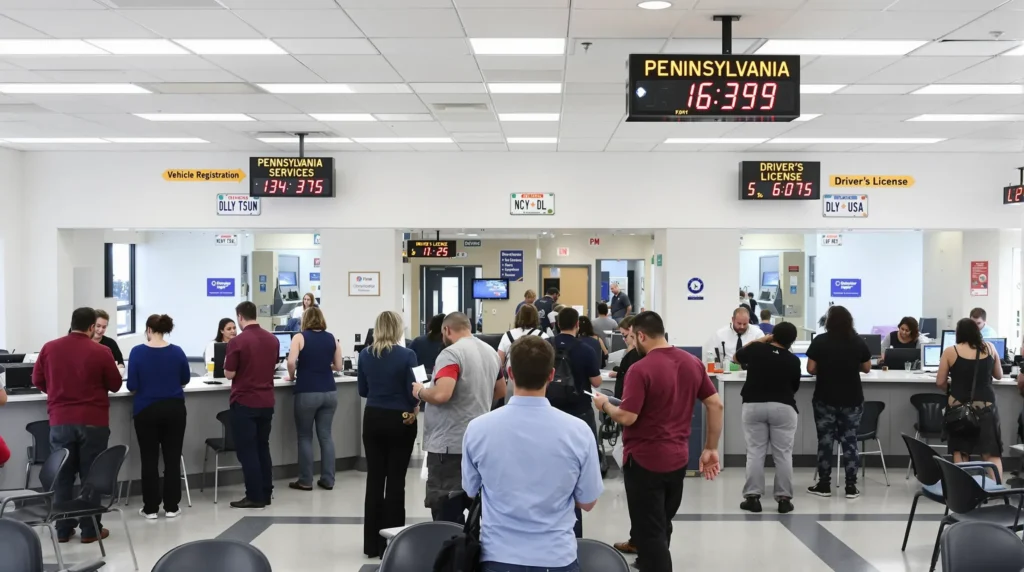
Common Questions and Troubleshooting for PA Car Registration
Even with a detailed guide, you might encounter questions or challenges during the registration process. Here are some common queries and troubleshooting tips:
- “How do I register a car I bought from a private seller?” Ensure you have the properly assigned Certificate of Title from the seller, along with a bill of sale. You’ll follow the standard registration steps outlined earlier, including VIN verification if needed.
- “What if I just moved to Pennsylvania?” As a new resident, you’ll need to register car in pa within a certain timeframe (usually 20 days of establishing residency). You’ll need to transfer your out-of-state title and registration to Pennsylvania, which involves VIN verification and meeting PA inspection requirements.
- “Can I register my car online?” While you can’t complete the initial pa registration new car process entirely online in most cases, you can often renew registration online pa and utilize online services for certain transactions through PennDOT authorized messengers.
- “What if I lost my registration card or license plate?” You can apply for duplicates online, by mail, or in person. There will be a fee for replacements. Contact PennDOT or visit their website for the specific procedures.
- “What is ‘penndot auto registration’?” “Penndot auto registration” is simply another way of referring to the vehicle registration services provided by the Pennsylvania Department of Transportation (PennDOT). It encompasses all aspects of registering and titling vehicles in PA.
- “What is ‘penndot plate renewal’?” “Penndot plate renewal” refers to the process of renewing your Pennsylvania license plates, which is typically done in conjunction with your vehicle registration renewal. In most cases, you keep your existing plates unless they are damaged or you choose to get personalized plates.
- “What is ‘registration penndot’?” Similar to “penndot auto registration“, “registration penndot” is a general term referring to vehicle registration services offered by PennDOT. It’s essentially the process of registering your vehicle with the Pennsylvania Department of Transportation.
If you encounter any issues or have specific questions not covered here, the best resource is the official PennDOT website ([Insert link to PennDOT website here – e.g., penndot.pa.gov]) or contacting PennDOT directly. They have dedicated resources and customer service to assist you with your pennsylvania vehicle registration needs. You can also find helpful information on websites like the Pennsylvania DMV ([Insert link to a general DMV information site if relevant, or remove if not needed]).
Conclusion: Your Keys to Pennsylvania Roads
Registering your car in Pennsylvania might seem like a task, but with the right information and preparation, it’s a process you can navigate with confidence. From gathering your documents and understanding registration fees to renewing registration pa annually, this guide has aimed to provide you with a comprehensive overview. By following these steps, you’ll ensure your vehicle is legally registered, allowing you to fully enjoy the freedom of the open road in the Keystone State.
Let me know if you would like any adjustments or further refinements to this article!
There are no reviews yet. Be the first one to write one.

